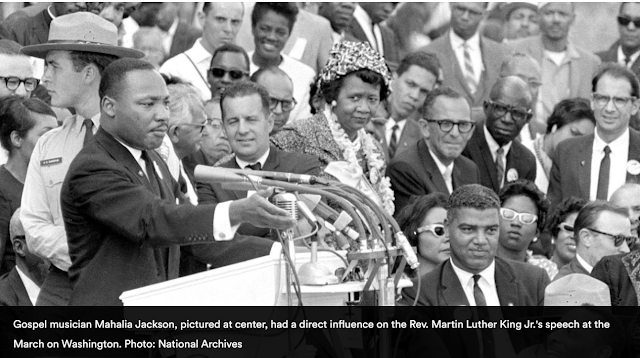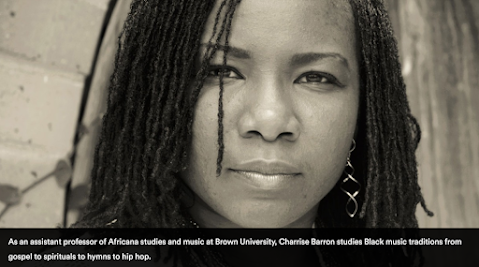Song and Power in the struggle for Justice
Brown University
In 2016, Beyoncé’s song “Formation” and accompanying “Lemonade” visual album combined overt political statements with references to African diasporic culture and Black Christianity, revealing close ties between Black American religious traditions and the Black Lives Matter movement. That faith and protest could be so closely interwoven surprised many — but not Charrise Barron.
As an assistant professor of Africana studies and music at Brown University, Barron studies Black music traditions from gospel to spirituals to hymns to hip hop — so she knows that music and Black American resistance have gone hand in hand since before the country’s founding.
Black Americans, Barron said, have leveraged the power of music to point enslaved people toward freedom, to unite coalitions of protesters in the Civil Rights Era, and most recently, to persuade millions to fight against anti-Black racism and police violence.
These and other music-driven movements will be fodder for discussion
in her two Spring 2022 courses, Social Justice and the Musical Afrofuture and
the graduate-level Black Movement Music.
In advance of Martin Luther King Jr. Day on Monday, Jan. 17, and
ahead of a Feb. 15 discussion on Race & Music in America where she is
a featured speaker, Barron shared insights on the centuries-long relationship
between Black American music and social justice movements throughout history
and offered thoughts on how the Black Lives Matter movement could employ music
to unite people around its cause.
Q: How did you find a career at the intersection of faith, music and social justice?
I grew up attending church in Houston. As a kid, I fell in love with gospel music. I played various instruments in church, and I’m still a musician today. In college, however, I concentrated in computer science, and I pursued a career in business systems analysis. After a while, seeking ordination for Christian ministry led me to seminary. That’s where I realized I could focus on the study of sacred music as a profession, and I began to study not only gospel but other forms of Black music. a
Q:
Why is it that music has helped fuel so many social justice movements led by
Black Americans?
This connection between music and protest and activism in Black American culture predates the founding of the American nation. Black people who were brought to the U.S. through the transatlantic slave trade brought with them traditions of communal music-making. Music-making, for them, wasn’t just something they did as part of religious rituals — it was a part of what they did in community.
And so once we began to see Black folks adopting Christianity
in the U.S., before the end of slavery, we began to see them mix their
music-making practices with the Christian music they were being taught and
theologies they were developing. That birthed spirituals and other music that
allowed them to express their hopes and frustrations about the situation they
were in.
Music was doing a lot of work for Black people. It was giving
them hope. It was giving them an escape from their lives in slavery. It was
helping them build community. It was helping to reinforce spiritual practices
and beliefs. It was also a powerful tool that helped them send coded messages,
communicate with allies and even persuade those who weren’t initially on the
side of whatever cause they were fighting for. And this is why music has been
so integral to Black activist movements throughout history.
Q:
What’s an example of a song that helped Black Americans communicate with
allies?
When I think about the classical Civil Rights Era of the 1950s
and 1960s — although the movement really began many decades before that, which
many people may not realize — I think of songs such as “We Shall Overcome.”
This is a classic example of a song that starts within Black churches, that
later gets picked up by the labor movement and that ultimately becomes a
timeless rallying cry for justice.
I think there are many reasons why this song unified people during the Civil Rights Movement. One is that it’s easily singable: The melody isn’t difficult to remember, and you don’t have to be a trained singer to sing it. And the lyrics are so simple and relatable.
“Deep in my heart, I do believe
we shall overcome someday” — there’s no overt claim or acknowledgment of
religion in those words, which means it can reach people across traditions,
ideologies, races, and it can speak so powerfully to the act of seeking
justice, any kind of justice.
'How
I Got Over'
Mahalia Jackson's performance of the gospel hymn "How I Got
Over" at the March in Washington demonstrates how Black faith and protest
are interwoven.
Music is a powerful tool. It can incite hope. It can incite
anger. It can incite a striving for peace. It can incite a commitment to
violence. One example of the genius of the Civil Rights Movement , in that
classical era, is the way activists leveraged music to bring people together
rather than to divide people or incite violence. They used music to soften
hearts and command the public’s attention.
Q:
The 1963 March on Washington was one of the most iconic moments of the Civil
Rights Movement. How did gospel music play a part in that event?
One of the most famous gospel artists of all time, Mahalia
Jackson, not only sang at the march but also drew on Black church tradition to
influence what has now become one of the most famous speeches in American
history.
People say that the Rev. Martin Luther King Jr. was in the
middle of reading a prepared speech when Jackson, who was on the rostrum near
the podium, shouted at him, “Tell them about the dream, Martin!” She and King
had traveled together, singing and speaking at events, and Jackson had
heard King describe the dreams he had for racial equality in the South and the
rest of the U.S. And her outbursts prompted him to leave his notes and start
extemporizing: “…[S]o even though we face the difficulties of today and
tomorrow, I still have a dream. It is a dream deeply rooted in the American dream…”
What Jackson did would have been familiar behavior to King, because she was drawing from the call-and-response tradition of the Black Church. In that tradition, preachers don’t just give speeches; instead the sermon is a kind of exchange or dialogue with the congregation. They say something, the audience responds, they speak again with the audience’s response in mind.
And that’s what Mahalia did — she engaged in a kind of
call-and-response, and it yielded a speech every American child learns about today.
That exchange is, to me, a demonstration of the important and close
relationship between faith and speech and music in Black social movements.
Q:
How long has that close relationship existed?
This music goes back, back, back. Before gospel was birthed during the Great Migration, there was the hymn tradition — “We Shall Overcome” was originally a hymn called “I’ll Overcome Someday” — and concertized spirituals, which were still being sung. All of this music became a pool from which activists began to draw. In the Civil Rights Era, there was a concerted, organized effort to use music as a kind of defense against fear.
Within the
Student Nonviolent Coordinating Committee, there was a group of civil rights
activists who got together to learn and practice music, and then they took it
back to the various groups they were leading. One of the leaders, Bernice
Johnson Reagon, has talked about how singing that music helped them to deal
with the life-and-death situation that was protesting. It trained them to keep
moving forward even when they felt the threat of violence from police and
civilians on the streets.
“ People say that the Rev. Martin Luther King Jr. was in the
middle of reading a prepared speech when Jackson, who was on the rostrum near
the podium, shouted at him, 'Tell them about the dream, Martin!' ”
Q: Do you think music is still fueling social movements such as Black Lives Matter today?
I think it is, to a certain extent, but we live in a different time. I’m in the early stages of writing a book about contemporary gospel music and protest, and some initial observations have led me to believe that there’s been a change in how Black people see Black churches.
In previous eras, the
Black church had a prominent position in Black American life, so it made sense
that the Civil Rights Movement was so intertwined with faith. The church was a
place where Black people’s spiritual, social and economic needs were being
addressed. That work is still happening, but the Black church isn’t necessarily
the center of Black social life now.
What’s interesting about the Black Lives Matter movement is that its musical soundtrack differs from place to place. In some areas, protests and activism are being driven by church leaders such as Rev. William Barber, who are drawing on the same music we heard during the classical Civil Rights Era.
In other areas, you see contemporary gospel music that’s associated with the
movement. We’re seeing a lot of hip hop music as well: Folks like Beyoncé and
Kendrick Lamar have put out songs like “Formation” and “Alright” that have
become Black Lives Matter anthems.
The impact of artists like Beyoncé and Kendrick Lamar and Janelle Monáe is evidence that a big star can certainly help raise awareness of social movements today by using their cultural capital and the power of social media.
But I’ve yet to see an activist galvanize the Black Lives Matter
movement around music the way King and Jackson and others did in the Civil
Rights Era. Some have said that Black Lives Matter doesn’t have enough music,
and that deficit of music corresponds with its hindered progress. I’ve been
thinking about that.
Q:
What would you say to someone who wanted to help drive people toward the Black
Lives Matter movement with music?
I would certainly tell them to take advantage of social media. You can teach a lot in a 15- or 20-second Instagram reel or TikTok. The other thing I’d like to see is more people utilizing lyrics that disarm. I’m thinking again about “We Shall Overcome” and “This Little Light of Mine.”
These songs allow people across beliefs, across ideological lines, to come together around a simple idea. And I wonder if there’s space to make more music like that — not just music that speaks out against hate but speaks out for bringing people together.
We have lots of music that laments or raises awareness of Black
Americans’ struggles, and that music is important, too. But is it possible to
create more music that builds community and reminds people to hope?

